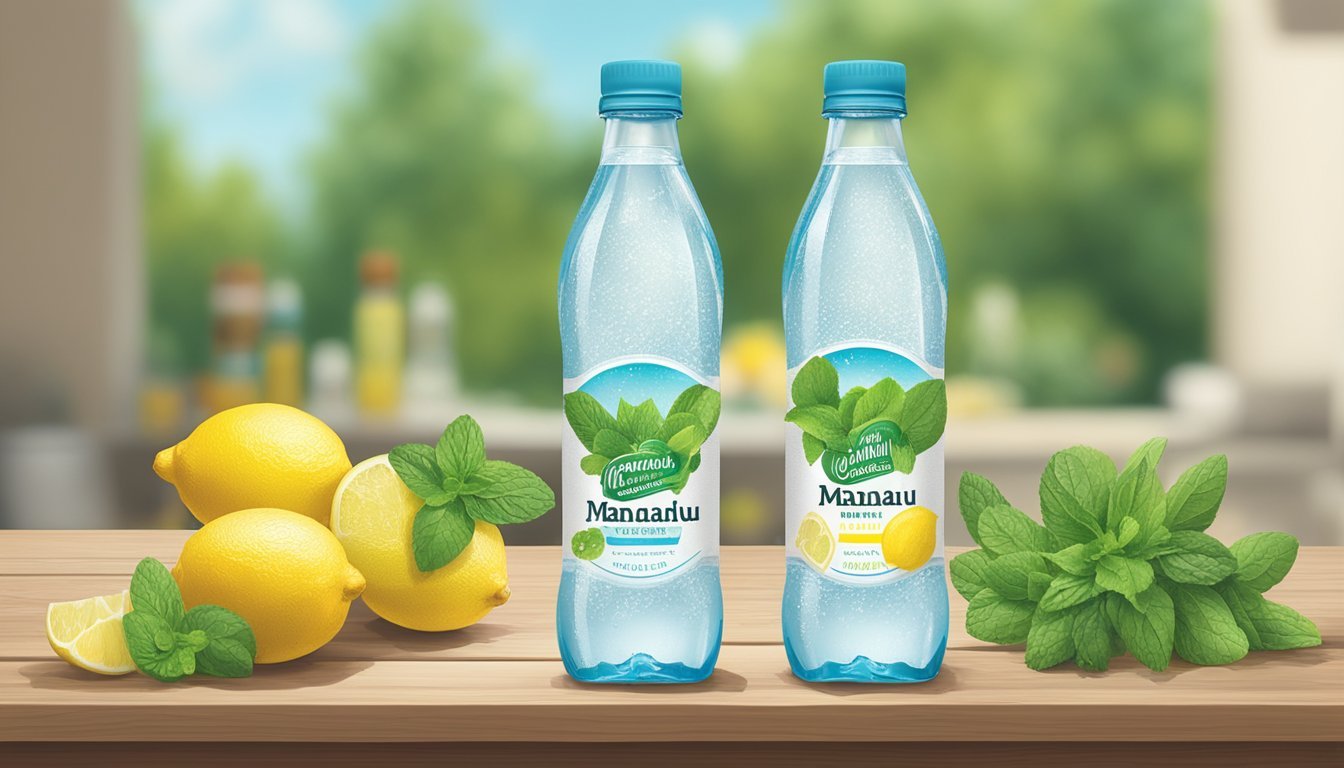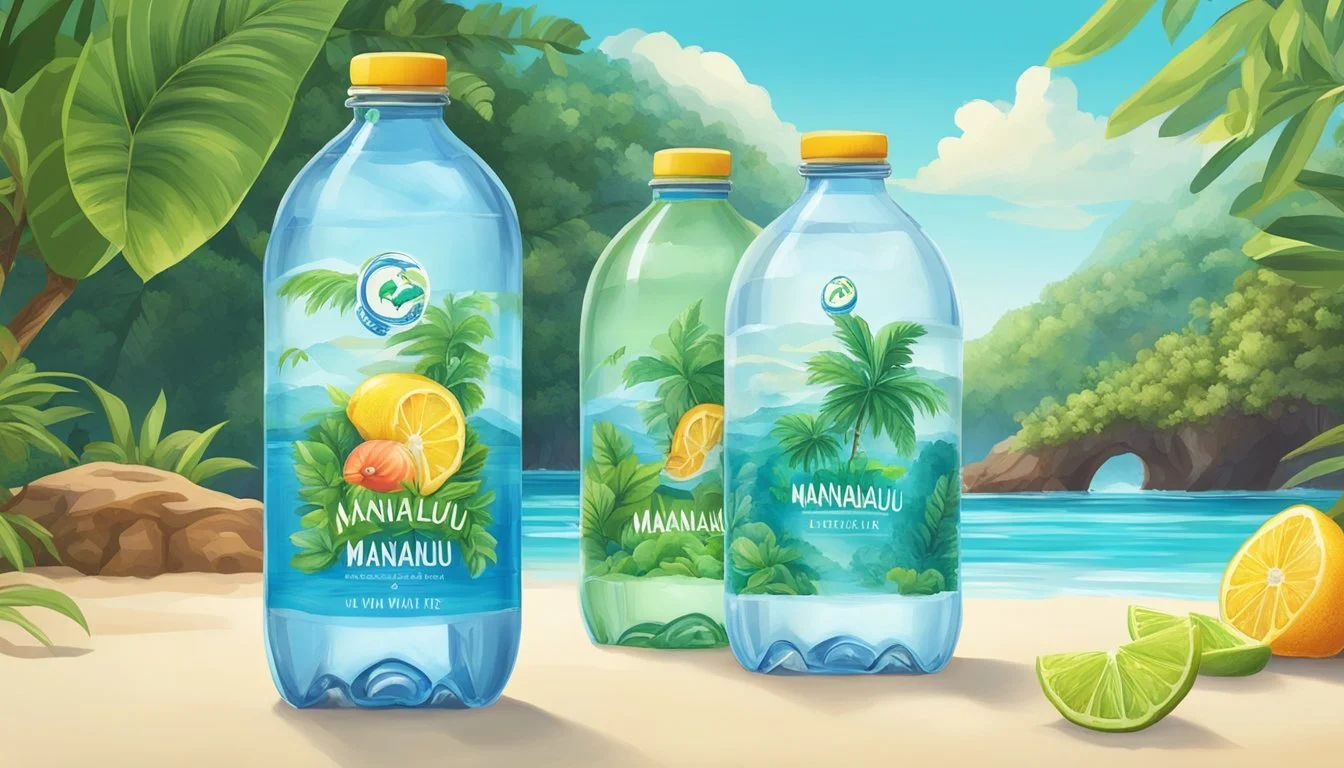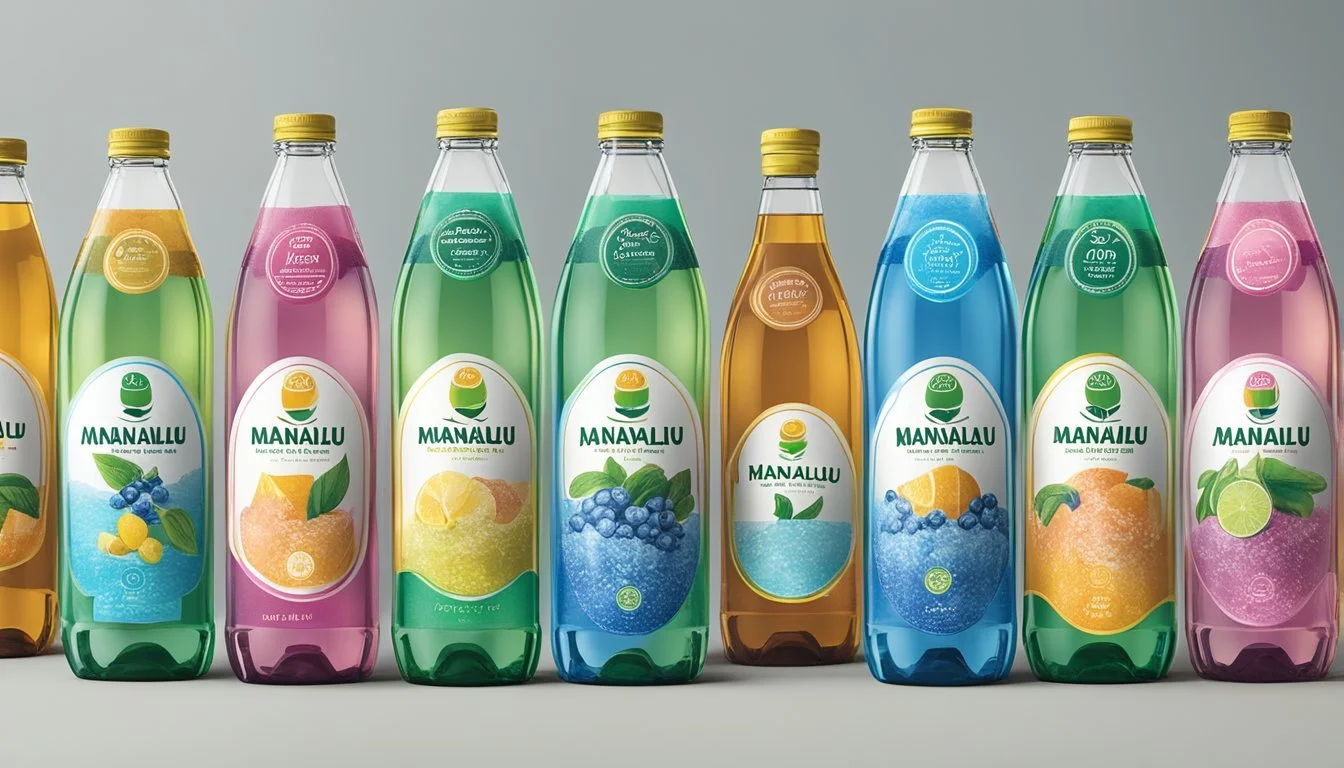Mananalu vs. Whole Foods Italian Still Mineral Water
Which Bottled Water is Better?
When it comes to choosing bottled water, consumers often weigh factors like taste, price, and environmental impact. Mananalu, a brand founded by Jason Momoa, aims to tackle the issue of single-use plastic by offering purified water in 100 percent recyclable aluminum cans. This mission-driven company has garnered attention not just for its celebrity backing, but for its strong stance on sustainability.
Compared to Whole Foods Italian Still Mineral Water, which boasts purity from natural springs and a focus on mineral content, Mananalu offers a more environmentally conscious choice. The Whole Foods option, while esteemed for its crisp taste and mineral benefits, typically comes packaged in plastic bottles, raising questions about long-term environmental effects.
Both options provide high-quality hydration, but the decision may come down to your personal priorities: a commitment to reducing plastic waste or the specific health benefits of traditional mineral waters. Dive into the details to find out which bottled water stands out for you.
Overview of Bottled Water Industry
The bottled water industry is a rapidly growing sector worldwide, characterized by innovations in packaging and heightened consumer awareness about sustainability.
Environmental Impact of Bottled Water
The environmental footprint of bottled water is significant. Single-use plastic bottles contribute heavily to plastic pollution. They often end up in oceans, harming marine life.
Aluminum is emerging as a more sustainable packaging option. It is 100 percent recyclable and lessens the impact on landfills. Brands like Mananalu prioritize aluminum over plastic.
Organizations such as Repurpose Global are helping companies mitigate their plastic output. By understanding these choices, consumers can select brands committed to reducing their environmental impact.
Consumer Trends in Bottled Water
The growth in the bottled water industry aligns with evolving consumer preferences. Modern buyers increasingly seek sustainable choices. They are informed about the consequences of single-use plastics.
Bottled water sales have soared globally, reflecting not just demand but the burgeoning interest in eco-friendly packaging. Retailers like Whole Foods Market cater to this segment by stocking brands that align with environmental responsibility.
This shift has pressured established brands to innovate and adopt more sustainable practices to meet consumer expectations.
Mananalu: The Brand and Its Mission
Mananalu, founded by actor Jason Momoa, is committed to reducing single-use plastic waste by offering purified water in aluminum bottles. This section outlines Momoa's vision, the sustainable choice of aluminum, and the brand's partnership with Repurpose Global.
Jason Momoa's Vision
Jason Momoa, known for his role as Aquaman, founded Mananalu with a mission to protect the oceans. He recognized the damaging impact of single-use plastics on marine life.
His goal with Mananalu is not only to provide clean water but also to encourage sustainable choices.
Momoa's brand stands as a testament to his environmental advocacy. It's designed to inspire consumers to make eco-friendly decisions easily integrated into their daily lives.
Aluminum: A Sustainable Choice
Mananalu uses infinitely recyclable aluminum for its bottles. Unlike plastic, aluminum doesn’t degrade after recycling, making it a more sustainable option. Each Mananalu bottle can be recycled repeatedly without losing quality.
This approach significantly reduces the dependency on single-use plastics.
The choice of aluminum aligns with the brand's mission to offer a more eco-friendly product. It highlights the importance of sustainability and sets a new standard for the bottled water industry.
Partnership with Repurpose Global
Mananalu has partnered with Repurpose Global to further its sustainability efforts. This collaboration focuses on removing the equivalent amount of plastic waste from the environment as produced by the brand.
Repurpose Global is known for its efforts in waste management and reduction programs.
Through this partnership, Mananalu ensures its commitment to not only reducing plastic use but also actively removing existing plastic waste. It represents a full-circle approach to sustainability, transcending beyond consumption to environmental action.
Whole Foods Market's Commitment to Quality
Whole Foods Market prioritizes quality and sustainability, particularly in their bottled water offerings. Their rigorous quality assurance processes and dedicated environmental initiatives set them apart.
Quality Assurance for Bottled Water
Whole Foods Market's quality assurance for bottled water encompasses strict testing protocols.
Each product undergoes rigorous scrutiny to ensure it meets high standards. Natural and organic foods are a hallmark of Whole Foods, and this extends to their water products. Bottled water must comply with stringent safety and purity guidelines, involving multiple rounds of testing for contaminants.
Additionally, Whole Foods works closely with reputable suppliers. They ensure that environmentally friendly practices are maintained throughout the production process. This collaboration aims to deliver a product that is both safe and of high quality to consumers.
Environmental Initiatives at Whole Foods
Environmental sustainability is central to Whole Foods Market's operations. Their bottled water sourcing reflects this commitment.
Whole Foods collaborates with suppliers who prioritize sustainable and ethical practices. They focus on reducing the carbon footprint and minimizing water waste during production. As a leader in natural and organic foods, Whole Foods promotes packaging solutions that are recyclable or biodegradable.
The integration of these practices demonstrates their dedication to preserving natural resources. Whole Foods also invests in community initiatives aimed at protecting water sources, underlining their broader commitment to environmental stewardship.
Comparative Analysis
To determine which bottled water is better, the article examines the water composition, packaging materials, and factors like price, accessibility, and consumer preferences.
Mananalu vs. Whole Foods Water: Composition and Origin
Mananalu offers purified water sourced from various locations. The TDS (total dissolved solids) values and pH levels vary but are generally kept within safe ranges.
In contrast, Whole Foods Italian Still Mineral Water originates from Italian springs. The water typically has a specific TDS content and a slightly acidic pH of about 5, indicating mineral presence. Originating from premium sources like La Galvanina Spa in Rimini, Italy, it boasts naturally occurring minerals.
Packaging: The Aluminum Advantage
Mananalu distinguishes itself with its sustainable packaging. The company uses 100% recyclable aluminum cans, aiming to reduce plastic waste significantly. Aluminum is infinitely recyclable, providing an environmentally friendly option for conscious consumers.
Whole Foods Italian Still Mineral Water usually comes in plastic bottles, although some versions are available in glass. Glass offers reusability but is heavier and less convenient in some cases. Despite this, plastic remains less favorable due to environmental concerns.
Price, Accessibility, and Consumer Preferences
Mananalu tends to be available in specialty grocery stores like Sprouts, and online platforms. The price point is higher due to the premium on sustainability and aluminum packaging.
Whole Foods Italian Still Mineral Water can be found easily in various grocery stores, including Whole Foods Market. Priced between 0.15-1.00 cents per bottle, it caters to a wide range of consumers, making it accessible and economical.
Preference might lean towards Mananalu for eco-conscious buyers, while Whole Foods appeals to those looking for authentic Italian mineral water at competitive prices.
Health and Environmental Benefits
When deciding between Mananalu and Whole Foods Italian Still Mineral Water, both health impacts and environmental considerations are crucial aspects. Evaluating these areas will help determine which brand offers better benefits.
Mineral Content and Healthier Choices
Mananalu and Whole Foods Italian Still Mineral Water offer distinct mineral profiles that cater to various health needs.
Mananalu provides purified water, ensuring a refreshing, clean taste without added minerals. This may appeal to those preferring lower sodium content in their beverages.
Whole Foods Italian Still Mineral Water, sourced from natural springs in Italy, contains beneficial minerals like calcium and magnesium. These minerals help nourish people, supporting bone health and muscle function. Yet, individuals concerned about sodium intake should review the specific content, as some mineral waters may have higher levels of sodium.
Reducing Plastic Pollution with Eco-Friendly Packaging
One of the significant advantages of Mananalu is its commitment to reducing plastic pollution. Their use of 100% recyclable aluminum cans addresses the problem of single-use plastic bottles.
Aluminum cans are more sustainable, mitigating plastic waste that often ends up in oceans and landfills. This supports environmental preservation goals and appeals to eco-conscious consumers.
While Whole Foods also offers products in recyclable containers, their Italian Still Mineral Water typically comes in plastic bottles. This results in more plastic waste, posing a greater environmental challenge compared to Mananalu's eco-friendly approach.
Choosing between the two entails balancing personal health requirements with a commitment to environmental sustainability.
Consumer Education and Involvement
Both Mananalu and Whole Foods Italian Still Mineral Water aim to educate consumers on sustainable choices and involve them actively in addressing environmental challenges.
Encouraging Sustainable Consumer Actions
Mananalu, led by CEO David Cuthbert and actor Jason Momoa, is committed to reducing reliance on single-use plastic water bottles. The brand offers water in 100% recyclable aluminum cans. This initiative helps consumers make eco-friendly choices and fosters awareness about plastic waste's environmental impact.
Whole Foods promotes similar values with its Italian Still Mineral Water, packaged in environmentally-friendly materials. By providing accessible products, both companies encourage customers to opt for sustainable options in their daily lives, underscoring their dedication to combating plastic pollution.
Transparency in Marketing and Labeling
Mananalu and Whole Foods prioritize transparency in their marketing and labeling practices. Mananalu clearly displays information about its ethically sourced water and the recyclability of its aluminum bottles. This transparency helps consumers understand the product's environmental benefits.
Whole Foods Italian Still Mineral Water similarly provides detailed labeling, emphasizing its sustainable packaging and sourcing methods. Clear labeling from both brands ensures that consumers are well-informed, empowering them to make educated decisions that align with their values. Consistent information helps build trust with consumers, reinforcing both brands' commitment to sustainability.
Conclusion
When comparing Mananalu and Whole Foods Italian Still Mineral Water, each offers distinct advantages for consumers.
Mananalu focuses strongly on sustainability. Using 100% recyclable aluminum cans, it addresses the environmental footprint left by single-use plastics.
Whole Foods Italian Still Mineral Water offers a taste of Italian culture. This water is typically found in glass bottles, associated with quality and tradition.
Quality is a subjective aspect. Some might prefer Mananalu's purified taste, while others might favor the natural mineral composition of Italian still water.
Environmental footprint is another key difference. Mananalu's mission prioritizes reducing plastic waste. In contrast, glass bottles, as used by Whole Foods' Italian water, are also recyclable but heavier to transport.
In terms of availability, Mananalu is easily purchased online and in various stores. Whole Foods’ Italian Still Mineral Water, predominantly available in Whole Foods stores, offers a convenient option for its regular shoppers.
Choosing between the two largely depends on what the consumer values more: a strong environmental mission or a traditional, mineral-rich water experience.
More About Mananalu
Hawaiian Springs vs Mananalu: Which Bottled Water is Better?
Icelandic Glacial vs Mananalu: Which Bottled Water is Better?
Mananalu vs Cascade Mountain: Which Bottled Water is Better?
Mananalu vs Kirkland Signature: Which Bottled Water is Better?
Mananalu vs Richard's Rainwater: Which Bottled Water is Better?
Mananalu vs Talking Rain AQA: Which Bottled Water is Better?
Mountain Valley Spring Water vs Mananalu: Which Bottled Water is Better?
Nestle Pure Life vs Mananalu: Which Bottled Water is Better?
More About Whole Foods Italian Still Mineral Water
Whole Foods Italian Still Mineral water vs HFactor: Which Bottled Water is Better?
Acqua Pana vs Whole Foods Italian Still Mineral water: Which Bottled Water is Better?
Antipodes vs Whole Foods Italian Still Mineral water: Which Bottled Water is Better?
Aqua Carpatica vs Whole Foods Italian Still Mineral water: Which Bottled Water is Better?
Aquafina vs Whole Foods Italian Still Mineral water: Which Bottled Water is Better?
Arrowhead vs Whole Foods Italian Still Mineral water: Which Bottled Water is Better?
Bai vs Whole Foods Italian Still Mineral water: Which Bottled Water is Better?
Boxed Water vs Whole Foods Italian Still Mineral water: Which Bottled Water is Better?
Castle Rock vs Whole Foods Italian Still Mineral water: Which Bottled Water is Better?
Core Hydration vs Whole Foods Italian Still Mineral water: Which Bottled Water is Better?
Deer Park vs Whole Foods Italian Still Mineral water: Which Bottled Water is Better?
Erewhon vs Whole Foods Italian Still Mineral water: Which Bottled Water is Better?
Essentia vs Whole Foods Italian Still Mineral water: Which Bottled Water is Better?
Eternal vs Whole Foods Italian Still Mineral water: Which Bottled Water is Better?
Ethos vs Whole Foods Italian Still Mineral water: Which Bottled Water is Better?
Evian vs Whole Foods Italian Still Mineral water: Which Bottled Water is Better?
Fiji vs Whole Foods Italian Still Mineral water: Which Bottled Water is Better?
Flow vs Whole Foods Italian Still Mineral water: Which Bottled Water is Better?
Hawaii Volcanic vs Whole Foods Italian Still Mineral water: Which Bottled Water is Better?
Hawaiian Springs vs Whole Foods Italian Still Mineral water: Which Bottled Water is Better?
Ice Mountain vs Whole Foods Italian Still Mineral water: Which Bottled Water is Better?
Icelandic Glacial vs Whole Foods Italian Still Mineral water: Which Bottled Water is Better?
Just Water vs Whole Foods Italian Still Mineral water: Which Bottled Water is Better?
LIFEWTR vs Whole Foods Italian Still Mineral water: Which Bottled Water is Better?
Liquid Death vs Whole Foods Italian Still Mineral water: Which Bottled Water is Better?
Nestle Pure Life vs Whole Foods Italian Still Mineral water: Which Bottled Water is Better?
Origin vs Whole Foods Italian Still Mineral water: Which Bottled Water is Better?
Ozarka vs Whole Foods Italian Still Mineral water: Which Bottled Water is Better?
Path vs Whole Foods Italian Still Mineral water: Which Bottled Water is Better?
Penta vs Whole Foods Italian Still Mineral water: Which Bottled Water is Better?
Perrier vs Whole Foods Italian Still Mineral water: Which Bottled Water is Better?
Poland Spring vs Whole Foods Italian Still Mineral water: Which Bottled Water is Better?
Purely Sedona vs Whole Foods Italian Still Mineral water: Which Bottled Water is Better?
San Pellegrino vs Whole Foods Italian Still Mineral water: Which Bottled Water is Better?
Smartwater vs Whole Foods Italian Still Mineral water: Which Bottled Water is Better?
Solan de Cabras vs Whole Foods Italian Still Mineral water: Which Bottled Water is Better?
Starkey vs Whole Foods Italian Still Mineral water: Which Bottled Water is Better?
Tahoe vs Whole Foods Italian Still Mineral water: Which Bottled Water is Better?
Topo Chico vs Whole Foods Italian Still Mineral water: Which Bottled Water is Better?
Tru Alka vs Whole Foods Italian Still Mineral water: Which Bottled Water is Better?
Volvic vs Whole Foods Italian Still Mineral water: Which Bottled Water is Better?
Voss vs Whole Foods Italian Still Mineral water: Which Bottled Water is Better?
Waiakea vs Whole Foods Italian Still Mineral water: Which Bottled Water is Better?
Whole Foods Italian Still Mineral water vs 1907water: Which Bottled Water is Better?
Whole Foods Italian Still Mineral water vs 7-Select: Which Bottled Water is Better?
Whole Foods Italian Still Mineral water vs Action: Which Bottled Water is Better?
Whole Foods Italian Still Mineral water vs Alkaline88: Which Bottled Water is Better?
Whole Foods Italian Still Mineral water vs Augi: Which Bottled Water is Better?
Whole Foods Italian Still Mineral water vs Big Chill: Which Bottled Water is Better?
Whole Foods Italian Still Mineral water vs Big Win: Which Bottled Water is Better?
Whole Foods Italian Still Mineral water vs Blk: Which Bottled Water is Better?
Whole Foods Italian Still Mineral water vs BodyArmor: Which Bottled Water is Better?
Whole Foods Italian Still Mineral water vs Cascade Mountain: Which Bottled Water is Better?
Whole Foods Italian Still Mineral water vs CBD Living: Which Bottled Water is Better?
Whole Foods Italian Still Mineral water vs Cirro: Which Bottled Water is Better?
Whole Foods Italian Still Mineral water vs Crystal Geyser: Which Bottled Water is Better?
Whole Foods Italian Still Mineral water vs Crystal Lake: Which Bottled Water is Better?
Whole Foods Italian Still Mineral water vs Dasani: Which Bottled Water is Better?
Whole Foods Italian Still Mineral water vs Defy: Which Bottled Water is Better?
Whole Foods Italian Still Mineral water vs Essence pH10: Which Bottled Water is Better?
Whole Foods Italian Still Mineral water vs Kirkland Signature: Which Bottled Water is Better?
Whole Foods Italian Still Mineral water vs Kroger: Which Bottled Water is Better?
Whole Foods Italian Still Mineral water vs Open Water: Which Bottled Water is Better?
Whole Foods Italian Still Mineral water vs Ophora: Which Bottled Water is Better?
Whole Foods Italian Still Mineral water vs Proud Source: Which Bottled Water is Better?
Whole Foods Italian Still Mineral water vs Pure Life: Which Bottled Water is Better?
Whole Foods Italian Still Mineral water vs Ramona: Which Bottled Water is Better?
Whole Foods Italian Still Mineral water vs Refreshe: Which Bottled Water is Better?
Whole Foods Italian Still Mineral water vs Richard's Rainwater: Which Bottled Water is Better?
Whole Foods Italian Still Mineral water vs Simple Truth: Which Bottled Water is Better?
Whole Foods Italian Still Mineral water vs Skyra: Which Bottled Water is Better?
Whole Foods Italian Still Mineral water vs Talking Rain AQA: Which Bottled Water is Better?
Whole Foods Italian Still Mineral water vs The Well: Which Bottled Water is Better?
Whole Foods Italian Still Mineral water vs Weird Water: Which Bottled Water is Better?
Whole Foods Italian Still Mineral water vs Whole Foods 365: Which Bottled Water is Better?
Whole Foods Italian Still Mineral water vs Zenwtr: Which Bottled Water is Better?
Zephyrhills vs Whole Foods Italian Still Mineral water: Which Bottled Water is Better?







